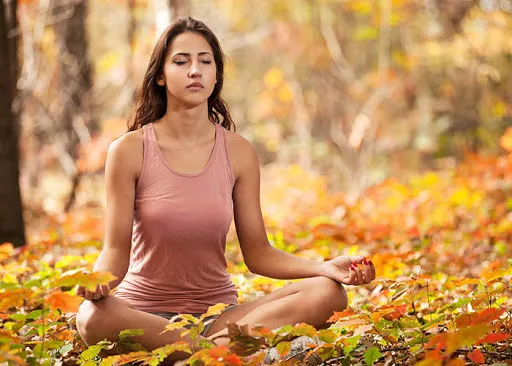

Whether you’re into yoga or not, I’m fairly certain you’ve at least heard of meditation. It’s one of the (oldest) new ways to improve your life.
And people are beginning to catch on.
The truth is there are some really major benefits to meditation (yoga is included, by the way).
And science agrees.
Before I get to the scientific evidence that meditation can improve your life significantly, let’s just address the fact that, for the most part, I’m excited to offer a Breathing and Meditation class with myYoga Teacher!
If you’re not yet a member, it’s definitely worth your time to grab a free 2-wee trial of MYT. You’ll have access to my class and 35+ more!
Also, more and more people are looking to alternative health practices, products, and practitioners to improve their lives.
Why? Well, everyone has their own reasons I suppose. But mostly it’s because they’re tired of feeling crappy. And whether their traditional forms of medicine are helping or not, there are side effects to all of them that make them feel terrible in ways they maybe weren’t before. Also, most people can agree, natural remedies, when available and helpful (not harmful) are just better for us.
With all that in mind, let’s get to the science behind it all.
Anxiety and depression is a big deal. Lots of people are crippled by it on a day to day basis. Did you know that according to the Anxiety and Depression Association of America, 40 million American adults suffer from an anxiety disorder? That’s about 18% of the population of the U.S. And it’s not all in their heads.
If you struggle with anxiety or depression, you are most certainly not alone, and you are definitely not the only one looking to alternative health practices to help alleviate your symptoms. Actually, congratulations! If you’re reading this, you’re taking an active, healthy step in overcoming your anxiety and/or depression!
According to PubMed (a highly regarded medical database of the National Institute for Health), regular practice of meditation over a period of 8 weeks or more will improve your anxiety and depression. Score one for alternative (or complementary) health! In case you aren’t aware, complementary health is a term used to describe alternative therapies that are used in conjunction with traditional ones.
So give meditation a chance to work if you try it at all. Don’t give up on it after a couple of times!
Also, I am in no way saying you should stop whatever your traditional doctor has prescribed for you and replace it with meditation. I’m simply telling you meditation is an excellent addition to help alleviate symptoms. If you love it and it works, then maybe you can talk with your doctor about your medication management.
There are many different types of meditation that are good for anxiety, depression, and insomnia. Here are a few popular ones:
For beginners, a guided version of any of these three would be the most beneficial. But even regular, long-term practitioners often still use guidance in their meditation practices.
Another way meditation and breathwork helps people?
Before you say anything, I completely understand some types of pain are not “cured” by meditation. There ARE other possible alternative therapies to assist with pain that are not traditional medicine or pharmaceutical related though, but that’s a different topic.
I’ll stay on track by saying the National Center for Complementary and Integrative Health (NCCIH) has conducted several studies that reveal that mindfulness meditation, mindfulness-based stress reduction training (MBSR), and Cognitive Behavioral Training (CBT) all help reduce pain, particularly back and neck pain, but also many other types of pain.
In some studies, “...scientists suggest that meditation activates certain areas of the brain in response to pain.” (NCCIH)
Most people who have chronic pain are willing to try almost anything. Trying something not harmful with zero side effects equals ZERO risk.
Yoga is also particularly great for pain management of some conditions such as fibromyalgia, migraines, arthritis, and low back pain. Ashtanga, Bikram, Kundalini, and hot yoga are all various types of yoga that assist with pain management. If you have questions or concerns about chronic pain, you should first speak with your physician.
Also, lots of people suffer with more than one problem. I’d go so far as to say most people do. Meditate on it. Boom. Killing two birds with one stone!
Or check out my Breathing and Meditation class for a simple, restorative practice for beginners.
Very, cliche, I know. But emotional health DOES matter!
Some other benefits people notice are:
According to studies done by the National Institute for Health, various different forms of meditation have been proven to improve one’s emotional well-being and overall mental health. I encourage you to do some research on what types of meditation would be most helpful for you, but some suggestions are Kindness-Based Meditation and guided mindfulness meditation. Which leads me to my next point.
Research published in the Journal of Experimental Psychology suggests that mindful meditation practices inspire people to be more empathetic and nicer to strangers.
Have you ever heard that f you’re looking for the negative, you’ll find it? If you’re looking for the bad in your life or just waiting for something bad to happen, you are finding it. Negativity attracts negativity. You may not even want to be kind because you’re so cynical right now.
The news is mostly negative.
Facebook is a lot of negative.
Road rage.
Waiting-in-line rage. I read once you are a culmination of the 5 people you surround yourself with the most. And what comes out of all of that is your contribution to unkindly behavior, words, and attitudes.
You can escape this pattern. I know because I did. Meditation makes me a nicer person. It’s improved my relationship with my husband and kids. I have less (almost none, actually) road rage and waiting-in-line rage. And I encourage myself and others daily to focus on the positive parts of their day or life. And honestly, that is almost solely due to guided mindfulness meditation practices. I am more peaceful, calm, content. And those feelings and attitudes produce more compassion, kindness, and empathy. EVERYONE can use more of those things.
This one does take work and practice. It’s not an overnight sort of “fix.” But if you dare to “open” your mind to it, it’s really not hogwash. And it can apply to everyone, from all walks of life.
This one is last primarily because addressing all of the above concerns is scientifically proven to help lower your blood pressure. But people completely underestimate the importance of having good blood pressure!
According to the NIH, hypertension affects nearly 1 billion people worldwide and results in 7.1 million deaths. The studies suggest that interventions such as meditation used either alone or with lifestyle changes has been shown to help decrease blood pressure.
Meditation is not a “cure-all” for high blood pressure, so don’t do it in lieu of seeing your doctor. But it’s scientifically proven to help lower it. According to the NCCIH, “A literature review and scientific statement from the American Heart Association suggest that evidence supports the use of Transcendental Meditation (TM) to lower blood pressure.” The American Heart Association website also has many other helpful (and practical) tips about lowering your blood pressure, in case you’re in need of another free resource that gives free advice on how to get (or stay) healthy without breaking the bank.
Not sure how to begin your practice of meditation and breathwork? Join us in my Breathing and Meditation class! All are welcome, and we’ll journey to better health through meditation together.
It’s also a perfect reason to go ahead and scoop up your free 2-week trial of myYogaTeacher! You’ll find all the support you need there from experts in yoga and meditation who are happy to help you navigate your path to better health, less stress, and more harmony!
Love, light, and peace!

Receive personalized guidance tailored to your unique fitness goals, live with a dedicated coach—no credit card required.